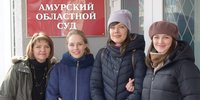The Case of Golik and Others in Blagoveshchensk
Filter
- #
Senior investigator of the FSB of Russia in the Amur Region I. A. Beloglazov conducts searches in 7 houses of residents of Blagoveshchensk. The searches were authorized by Oleg Filatov, judge of the Blagoveshchensk City Court of the Amur Region.
It becomes known that in October 2017, operatives installed a listening device in the apartment of Kristina Golik and her husband, Dmitry Golik , and collected information for six months.
- #
From the materials of the criminal case against believers Anton Olshevskiy and Sergey Yermilov, materials against their wives, Ekaterina Olshevskaya and Valentina Ermilova, as well as against Kristina Golik, whose husband was sentenced to 7 years in prison for his faith, are separated into separate proceedings.
Another charge is brought against 27-year-old believer Maria Portnyagina. This criminal case is initiated by the investigator of the SO of the FSB in the Amur Region, Senior Lieutenant of Justice V. S. Obukhov. The women are charged with a crime under Part 2 of Article 282. 2 of the Criminal Code of the Russian Federation. The investigation claims that they "being in the city of Blagoveshchensk ... were directly involved in... religious events."
- #
Investigator Obukhov brings Kristina Golik and Maria Portnyagina as accused. He argues that believers, "wishing for the onset of socially dangerous consequences and acting from extremist motives ... committed actions related to the continuation of the illegal activities of the CRO and LRO of Jehovah's Witnesses in Blagoveshchensk."
Golik and Portnyagina are chosen a measure of restraint in the form of a written undertaking not to leave and proper behavior.
- #
Investigator Obukhov involves Ekaterina Olshevskaya as an accused. A measure of restraint is chosen for the believer in the form of a recognizance not to leave and proper behavior.
- #
Investigator Obukhov involves Valentina Ermilova as an accused. A measure of restraint is chosen for the believer in the form of a recognizance not to leave and proper behavior.
- #
The criminal case goes to the Blagoveshchensk City Court of the Amur Region. It will be considered by judge Stanislav Stanishevsky.
- #
The trial is being held behind closed doors. The Public Prosecutor shall announce the indictment. The defendants express their attitude to the charge.
- #
State prosecutor Svetlana Levchenko reads out the indictment.
- #
The materials of the case, which describe a friendly meeting in the café "Sanya", are read out. Having reached the scene "The Three Little Pigs", the judge passes the text to the prosecutor, to which she asks whether it is worth reading the fairy tale. Kristina Golik states: "If the scene about the three pigs is attributed to extremism, then it should be read out in full." Prosecutor Levchenko refuses to read the fairy tale and proceeds to list the dances, competitions and names of the participants.
- #
The reading of the case materials continues, including a conversation between Kristina Golik and a woman on a biblical topic, as well as friendly communication between the Golik and Yermilov families.
- #
The prosecutor reads out the materials of the case, which, among other things, touches upon the topic of the importance of cleanliness and neat appearance.
- #
The reading of the case materials, in particular the transcript of one of the services, continues. The defendant Ekaterina Olshevskaya draws the court's attention to the fact that she did not promote extremism, did not exert pressure on anyone and in no way undermined the constitutional order. On the contrary, believers said that a person should be sensitive, humane and kind, should preserve peace and pay attention to the family.
- #
From the 2nd to the 32nd volumes of the case materials are read. Among them are the protocols of searches and inspection of items seized during the search, as well as the conclusion of a religious examination.
- #
The chief accountant of the organization that rented out the hall for worship is being interrogated. The witness says that the lease agreement was concluded not with a legal entity, but with an individual, while she is not personally acquainted with the defendants.
Another prosecution witness, who previously attended the services of Jehovah's Witnesses, says that there are no forced financial fees for them: "Whoever can and wants as much, there are voluntary donations."
The owner of the apartment, which was rented by the Golik family, is summoned for interrogation. He says that he rented the apartment under the contract to Dmitry and Kristina, because "[he] liked them, friendly." He did not discuss any religious matters with them and did not see any religious materials in the apartment.
The prosecutor reads out the testimony of a witness, which says that there was a map of Israel hanging on the wall in Golikov's room.
Several other witnesses invited by the prosecution say they do not know the defendants.
- #
The defendants are asked to interrogate experts Averina, Malanchuk and Kipchatova.
- #
11 people come to the courthouse to support the believers.
Specialist A. Zatochny, who conducted a computer examination, is being interrogated. He cannot recall the names of the participants in the criminal case against whom he conducted the study, but points out that they belong to the religion of Jehovah's Witnesses.
When asked by the defense whether it is his duty to establish the affiliation of the objects under study to any organization, for example, to a religious organization, he replies that he is not. - #
The judge reads out a letter that came from Germany: "Ladies and gentlemen, are you not ashamed to lock up these beautiful young women for reading the Bible? […] Jehovah's Witnesses are not extremists."
- #
The prosecutor asks the court to sentence Kristina Golik, Maria Myasnikova, Valentina Yermilova and Ekaterina Olshevskaya to 3 years of imprisonment in a penal colony, for the latter - with a respite of punishment until her child reaches the age of 14.
- #
Kristina Golik and Maria Myasnikova disagree with the position of the prosecution during the debate. Maria Myasnikova says: "We did not violate public order and public safety. Our actions have not harmed religious diversity in the Amur Region... There are no victims in the case."
Kristina Golik notes that there was no criminal component in her actions: "The prosecution is completely focused on creating the impression that the discussion of the Bible among friends is nothing more than a continuation of the activities of an extremist organization."
- #
Valentina Yermilova, who, like the rest of the defendants, does not agree with the charges, takes the floor. "It's inconceivable that believers would stop ... sing spiritual songs, pray, preach, and discuss doctrinal sources. The opposite means having to renounce one's faith under pain of criminal liability," she said.
- #
The defendants make their final statement, emphasizing that they peacefully practiced their faith and their actions had nothing to do with extremism.
Defendant Maria Myasnikova's concluding remarks in Blagoveshchensk Defendant Ekaterina Olshevskaya's concluding remarks in Blagoveshchensk Defendant Valentina Yermilova's concluding remarks in Blagoveshchensk Defendant Kristina Golik's concluding remarks in Blagoveshchensk - #
- #
- #
Kristina Golik, Valentina Ermilova and Maria Myasnikova receive referrals to Correctional Center No 1 in the Primorsky Territory. Believers will live at different addresses. They need to arrive at the place of prescription by April 29.
- #
Kristina Golik is serving a sentence of forced labor in the city of Nakhodka, at a fish factory. The schedule is tight: two day shifts, two night shifts, and then two days off. On free days, Kristina has the opportunity to go to the city, having previously received official permission from the head of the correctional institution in which she lives.
Night shifts, as well as discomfort due to the acrid fishy smell, exhaust the believer most of all. Despite this, the emotional state of the couple Golik remains good.
- #
The Ninth Court of Cassation of General Jurisdiction considers the cassation appeal of the lawyer and upholds the verdict.
Kristina Golik, addressing the court, explains why charging her with extremism is untenable: "The reason is that I love people very much! I am not indifferent to what is happening in the world, so I study the Bible. I learn to live by high moral standards, to respect people's decisions, no matter what their color, race, nation, or religious background. To me all people are valuable and this is what I learn from the Bible."
Mariya Myasnikova quotes the words of the director of the International Center for the Study of New Religions, Massimo Introvigne: "'The only relationship between Jehovah's Witnesses and violence is that they have been victims of violence.' On this occasion, my family and I have become the injured party of this unfair charge."
Valentina Yermilova relates what her family had to face because of the prosecution: "We [ Sergey and I] have been together for 30 years... Now he is in a penal colony in Nizhny Tagil, although he is not guilty of anything. [...] Our parents died during the proceedings. I am deprived of the possibility to visit a dear and beloved person. And we are no longer very young and our health leaves much to be desired. We need each other's support."

